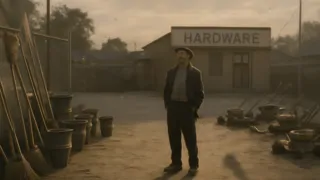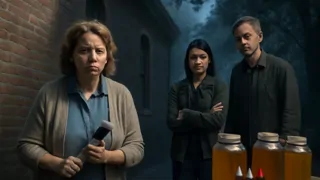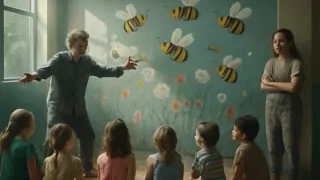Introduction
You’d never expect intrigue or unusual stories from Willow Falls, Illinois. It sits far from any city that’s made a map or a memory, squashed between soybean fields and the slow, brown slip of the Wabash River. The post office, with its handful of boxes, closes at noon on Saturdays. The one grocery store stocks Spanish moss as a prank. Most folks meet for pancakes, not political upheaval, and the loudest sound most weekends is the whir of Mrs. Underwood’s ancient blender at the All-Day Diner. Yet there remains one story that stirs unease and wry laughter around chipped mugs—about the man who could imitate a bee as if he had wings and venom of his own.
Gordon Wickett was a staple in oddball town lore long before he took up buzzing. Unmarried, thirty-three, with perpetually rumpled shirts and a fondness for peach preserves, he lived in the attic apartment above his mother’s faded Victorian. His job as the night janitor at Zaff’s Hardware was solidly unremarkable, and his conversations, when they happened at all, focused on rainfall and the precise difference between honeybees and wasps. Yet, for all of his apparent mediocrity, Gordon carried the peculiar gift of the convincingly uncanny—the sound and mannerisms of a honeybee, produced not by machine but by his own lips, throat, and lungs. He didn’t share the ability until a thrown shoe at a backyard barbecue missed the mark, and he ducked, shuddered, and filled the dusk with an electrical, insistent buzzing so true and panic-inducing that Betsy Wilkes dove headlong into her potato salad, convinced a swarm was upon her.
That moment, half-embarrassment and half accidental exhibition, didn’t just spiral through town gossip; it changed Gordon’s life, and the pattern of Willow Falls. Some laughed; children poked him with sticks by the gas station. Others eyed him with a new kind of wariness. The hardware store gained late-night customers who asked to hear ‘the bee-man trick,’ and one spectacularly strange spring, mysterious bee-related pranks swept the town: pies riddled with plastic insects, anonymous buzzes in hallways, dog biscuits arranged in honeycomb patterns. At first glance, Gordon shrugged these off. Then, darker turns followed—a neighbor’s prized tomatoes destroyed overnight by an apparent bee stampede, and a town councilor’s allergic reaction after honey left on his porch. All eyes turned to Gordon. But was he truly responsible? Or was his talent a cover for someone else’s mischief? The answer would take Willow Falls on a journey from laughter to suspicion and eventually, to a twisting truth only the man who could imitate a bee could see coming.
The Buzz Heard ‘Round Willow Falls
When Gordon first let slip his bee impression at Trudy Cannon’s barbecue, he expected only embarrassment. But in a town where even mild weather is headline news, novelty has gravitational force. News of his talent traveled fast—from Harley, who runs the bait shop, to Mrs. Underwood, who dubbed him ‘our very own hive.’ The following Monday at Zaff’s Hardware, Gordon found a beehive-shaped lump of honeycomb candy at his mop station. That evening, two teenagers waited by the window, giggling and daring each other to ask for a performance. Gordon, uncertain but quietly proud, obliged. He inhaled deeply, filled his cheeks, vibrated his lips, and buzzed out a performance both musical and menacing, his body twitching in full insect mimicry. The sound was so authentic that even Russ, a tough ex-Marine with a buzzcut (irony noted by many), flinched and spilled a box of screws.

But novelty, in tight-knit places, soon grinds at the nerves. Within a week, the town split into factions. Some adored Gordon’s trick; others muttered about unsettlement and ‘unmanly peculiarities.’ A gang of children followed him on his evening walks, chanting, “Bee-Man! Bee-Man! Show us your stinger!” Gordon began cowering from attention, his buzz reserved only for private moments. Yet, the trick became more than party fodder. Miss Elsie Talbot started mailing him clippings about the decline of honeybee populations, and someone anonymously left a set of beekeeper gloves at his door.
As spring melted into a heavy, pollen-laden summer, Willow Falls changed. Those bee-related pranks started small—a pie on the mayor’s porch dotted with plastic stingers—but they escalated. The library's reading hour was interrupted by drone recordings piping in mysterious bee noises. Principal Vickers discovered a sticky yellow puddle poured down his car’s AC vent. Rumors spread: was Gordon staging a campaign of buzzing mischief for revenge, or was some copycat using his newfound reputation as camouflage?
One night, as Gordon locked up after waxing the aisles, he noticed a hum behind the store. Yellow and black stripes flashed under the sodium streetlamp. He crept closer, heart pounding, convinced a real swarm threatened his ankle socks—only to discover Vivian Pike, the old undertaker’s daughter, spray-painting a caricature of a giant bee with a mop for a stinger on the brick wall. She grinned at Gordon with madcap fervor and marzipan-scented breath. “Saw it in a dream,” she winked, “You’re more famous than you think, Bee King.”
That encounter might’ve passed for teenage pranksterism if it weren’t for the string of petty misfortunes that followed. Farmer Simms’s tomatoes were trampled, the local dentist suffered a fake bee sting in his sandwich, and a town councilman wound up in the ER after a honey prank gone wrong. By midsummer, suspicion had seeded itself deep in Willow Falls. Gordon woke to find his mailbox jammed with honey, his car window marked with a bullseye drawn in pollen dust. He retreated further, closing curtains and perfecting his repertoire: the low, ominous buzz of a hive disturbed; the frantic whine of a lost worker bee; even the subtle, almost musical rhythm of a queen’s flight. It became less an act and more a shield.
But the damage was done. Children stopped pointing and started whispering. Friends became wary. Betsy Wilkes, ever the ringleader, led a delegation to “request” Gordon stop his buzzing entirely. The grocery cashier, a stern-faced woman who once admired his knowledge of wildflowers, began to toss his change on the counter instead of placing it in his hand. Gordon’s mother could only shrug. “People fuss, they forget. You do what you love, son. Even if it means buzzing at the world. Just be kind with your stinger.”
Night in Willow Falls began to pulse with a different energy. Some claimed to hear buzzing from attic windows, to see Gordon’s shadow flit across moonlit lawns. Others swore they glimpsed Vivian Pike sneaking into the cemetery with a box of sugar cubes and a paintbrush. Yet, through it all, no evidence could be pinned on Gordon, and his odd talent remained, both burden and balm, as the townsfolk’s suspicion edged into obsession.
Stings and Unsolved Mysteries
The summer wore on, and paranoia replaced novelty. Every new prank—plastic bees in soup, honey slathered on doorknobs, the library plastered with hexagonal yellow post-its—stirred a hunger for answers. Gordon, meanwhile, drifted in and out of his routines. His attic filled with stacks of entomology books, jars of wildflowers, and gadgets of his own invention: a tiny, homemade microphone to amplify and record his buzzing for posterity. No one, not even Gordon, knew why he clung to the skill long after the joy faded. Perhaps imitation was, for him, a secret kind of communication—a bridge between himself and the world that always seemed to watch but rarely understood.

Vivian, ever more omnipresent, became Gordon’s unlikely confidante. She popped up at Zaff’s, sketchbook in hand, scribbling cartoon bees in the margins of receipts. Over midnights spent behind the town’s crumbling rec center, she confessed her own oddities—a passion for frogs, a longing for applause. “Maybe we’re the same species,” she joked. They built a rapport buzzing Morse code through the heating vents, their coded messages an underground resistance against suspicion and loneliness.
One August afternoon, an old friend of Gordon’s mother, Deputy Clyde Harker, came knocking. Harker’s mustache bristled with authority and uneasiness. “Reports have come in. Tomatoes, allergic reactions, the works. Folks say they’re scared. They say the Bee-Man’s crossed a line.” Gordon flushed, defended his innocence, but Harker only shrugged. “I know you, son. But the town wants answers. Best keep your wings tucked in.”
The turning point came during the Willow Falls Summer Jamboree—a fair filled with blue-ribbon pies, children’s games, and, for the first time, a ‘Bee Costume Contest.’ Five children and one dog wore Gordon-style glasses. Vivian, dressed as a punky queen bee, cackled from the dunk tank. Suddenly, the mayor dropped, choking and red-faced, next to a jar of mysterious honey. Ambulances blared. In the ensuing chaos, Betsy Wilkes pointed directly at Gordon, who stood shell-shocked beside the lemonade stand. “You! You’re behind this! Your curse has finally done us in!”
It was nasty, public, and humiliating. In the days following, Gordon found himself virtually exiled. Yet, he’d begun to notice cracks in the story—a strange shimmer on the mayor’s honey jar, footmarks not his around his property, a whiff of artificial almond (not bee-related at all) lingering in the air. With Vivian’s help, a plan took shape. They would catch the real culprit—not just for Gordon’s sake, but for the town’s peace.
They staked out late-night spots: the grocery, the diner, and finally, the shadow-haunted back lot of the town hall. There, through the crackle of leaves and the swirl of nighttime insects, they caught a figure in the act—Betsy Wilkes herself, armed with turkey baster, food dye, and a bucket of synthetic honey. Confronted, Betsy crumpled, her grudge spilling out: old envy, slights, and the humiliation of having once slipped in a puddle at Gordon’s childhood spelling bee victory. “You made the town laugh at me,” she hissed.
Vivian suggested a compromise. “We all wear our stripes differently. Maybe it’s time we stop stinging each other.” Betsy wept, and, to Gordon’s amazement, agreed to let the truth come quietly. No police, no spectacle—just a secret curative meeting between the three, hazed in dusk and hope. The pranks stopped. Honey stopped appearing in shoes. The mayor, recovered, sheepishly awarded Gordon an ‘unofficial merit’ for “services to the town economy, pollinator awareness, and keeping everyone on their toes.”
It wasn’t a perfect redemption—stigma lingered, some folks kept their distance—but Willow Falls began to accept Gordon in the way it always had: circuitously, with a blend of fondness and wariness. Gordon, for his part, never stopped buzzing. If anything, he did it more. Now, his performances belonged to the children’s summer reading hour, to the open windows of the rec center, and to countless evenings spent beneath the willow trees with Vivian, humming the wild songs of a world overlooked.
The Hive Inside: Acceptance and Odd Affinities
In the months after Betsy’s quiet confession, Willow Falls crawled toward a subtle, imperfect peace. Life settled back into known rhythms. Harvest festivals replaced bee-themed contests, and Zaff’s Hardware’s late-night traffic evaporated, much to Gordon’s relief. The notoriety faded but never vanished—whenever a bee buzzed past a picnic, some jokingly snapped, “Gordon, is that your cousin?” And sometimes, in the privacy of sunset, when cicadas droned and the air thickened with river scent, a passing stranger or timid child would pause to listen as Gordon shaped the impossible music of a flying bee.

Gordon’s world, vast and quiet, shifted inward as well as outward. His attic, once a haven of careful isolation, became a hive of new things: local schoolchildren came for summer science lessons, learning the ‘importance of pollinators’ alongside the subtler lesson of respecting difference. Vivian, for all her chaos and electric stubbornness, kept close. She painted a mural inside the rec center—a riot of bees buzzing over wildflowers, with a small caricature of Gordon in the corner, mop and all, smiling cryptically.
For Gordon, the bee imitation was never a true performance, not like stage magicians or ventriloquists. It carried weight, a history of loneliness that had long merged with resilience. Some afternoons brought setbacks: an old bully resurfacing at the diner, a supermarket checkout line gone silent. Gordon sometimes wondered if the isolation would ever lift entirely. But then, there were moments—a gleeful chorus of kids, a stranger’s warmth, Vivian’s laughter echoing over the Wabash—when oddness felt less like a burden, and more like a badge. His mother, quietly pleased and ever practical, began canning peach preserves again, gifting jars inscribed “Bee True.”
Occasionally, the mysteries of Willow Falls rippled anew—a flock of sheep found covered in yellow sheep-safe powder, a garden shaped like a honeycomb, a series of cryptic prank letters signed ‘the Drone Brigade.’ Gordon smiled knowingly, suspecting but never accusing. In embracing the role of bee-man, he found he could carry both suspicion and acceptance inside him, humming together. His talent, unasked for but finally understood, became less of a shield and more a gentle invitation: an eccentric’s call for connection, warmth, even love. And sometimes, as he stood on that creaky Victorian porch with dusk thickening around him, he’d buzz a little tune—not because he had to, but because the world, in all its strange colors, was brighter for it.
Conclusion
Gordon Wickett never became normal by Willow Falls standards—he remained the Bee-Man, a little apart and a little beloved. But his story buzzed through town longer than any scandal or weather disaster. In learning to embrace what set him apart, Gordon taught Willow Falls a lesson it never knew it needed: that eccentricity, even when misread and maligned, can offer a fresh way to belong. The town’s suspicion, stoked and then soothed, turned to something richer and deeper: respect not built on sameness, but an honest recognition of difference. For Gordon, the days grew softer, less edged by worry, as his gift evolved from a defense to a celebration. He found purpose in every buzz, and, in time, even in every wary glance. When summer faded, and autumn gold pushed through the leaves, Gordon and Vivian led the town’s first lantern walk, his hum floating above the crowd—half invitation, half benediction. Life, imperfect, strange, and wonderfully unpredictable, had at last woven Gordon into its fabric, not only as a curiosity, but as a cherished note in the town’s changing harmony.

















